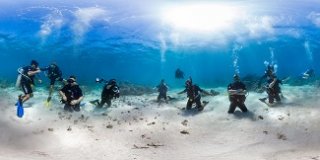EPA's Coral Reef Partners

Partnerships are critical to protecting coral reef ecosystems. Governments, non-governmental organizations, and the private sector need to work collaboratively to address the complex challenges facing these critical ecosystems. One-way the EPA is broadening its impact is through partnership with the U.S. Coral Reef Task Force (USCRTF) and its member organizations. Through the USCRTF, the EPA partners with the International Coral Reef Initiative to stay connected worldwide.
On this page:
- U.S. Coral Reef Task Force
- National Oceanic and Atmospheric Administration
- U.S. Geological Survey
- International Coral Reef Initiative
U.S. Coral Reef Task Force
EPA is actively engaged in the U.S. Coral Reef Task Force (USCRTF) . The USCRTF was established by Executive Order 13089 to lead U.S. efforts to preserve and protect coral reef ecosystems. It is instrumental in building partnerships and strategies for on-the-ground action to conserve coral reefs. The USCRTF is co-chaired by the National Oceanic and Atmospheric Administration and the Department of the Interior with regular participation from 14 federal agencies, seven U.S. states and territories, and commonwealths and three freely associated states.
EPA participates on several USCRTF working groups, including the Climate Change, Coral Disease, and Watershed Working Groups. Recent products of these working groups that the EPA helped to develop include:
Corals and Climate Adaptation Planning (CCAP) Adaptation Design Tool and User’s Guide
The Corals and Climate Adaptation Design Tool can be used by coral reef managers to incorporate climate-smart design into their programs and projects at any stage of planning and implementation. The tool has been used with partners in Guánica Bay, Puerto Rico and West Maui, Hawai'i.
Handbook on Coral Reef Impacts: Avoidance, Minimization, Compensatory Mitigation, and Restoration
This Handbook on Coral Reef Impacts provides a review of the federal authorities, existing policies, and federal, state, and territory roles and responsibilities; a compendium of current best practices—science-based methodologies for quantifying ecosystem functions or services; and a general overview of basic protocols available for use when assessing impacts to coral reef ecosystems and mitigating or restoring for unavoidable impacts to coral reef ecosystems, including the use of appropriate compensatory action to replace the lost functions and services.
USCRTF Watershed Partnership Initiative Priority Ecosystem Indicators
The USCRTF Watershed Partnership Initiative Priority Ecosystem Indicators document provides coastal managers, coral reef managers, and watershed coordinators faced with modest budgets a suite of recommended ecological indicators and measurements to include in their watershed-specific monitoring plans. The recommended ecological indicators and measurements help determine the efficacy and evaluate the success of management efforts to reduce land-based sources of pollution on coral reef ecosystems.
USCRTF Watershed Partnership Initiative Programmatic Checklist
A user-friendly programmatic checklist developed to help managers and watershed coordinators identify programmatic needs for the successful implementation of a ridge to reef watershed management plan.
National Oceanic and Atmospheric Administration Programs
The National Oceanic and Atmospheric Administration’s (NOAA) works to address key threats that impact coral reefs through a ridge-to-reef approach. NOAA’s efforts to protect coral reefs range from coral mapping, monitoring, and modeling, to on-the-ground and in-water restoration activities. Visit the Coral Reef Conservation Program and the Coral Health and Monitoring Program to learn more about NOAA’s multidisciplinary approach to protecting coral reefs. Visit the Coral Reef Information System (CoRIS) portal to access information and data on coral reef mapping, monitoring, and assessment; natural and social economic research and modeling; outreach and education; and management and stewardship.
U.S. Geological Survey Programs
The U.S. Geological Survey (USGS) provides science about natural hazards, water, energy, minerals and other natural resources that are important to America’s ecosystems and environment. USGS scientists develop new methods and tools to enable timely, relevant, and useful information about the Earth and its processes. Visit the St. Petersburg Coastal and Marine Science Center and Pacific Coastal Marine Science Center websites to find information on USGS research programs and publications that focus on ocean issues. To find coral reef specific research, publications, data, and tools visit The Coral Reef Project.
International Coral Reef Initiative
The U.S. Federal Government is a member of the International Coral Reef Initiative (ICRI),a partnership between Nations and organizations which strives to preserve coral reefs and related ecosystems around the world.
